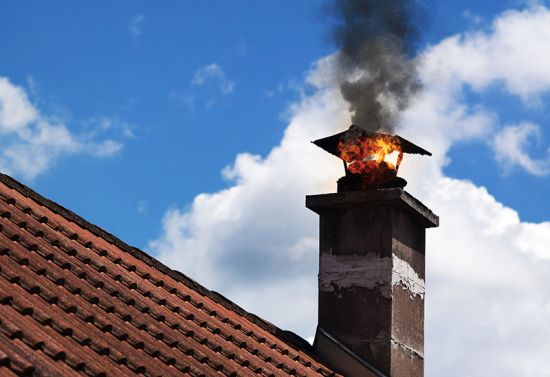Chimney Fires – Be In The Know!

There is nothing more enjoyable than cuddling up in front of your fireplace and enjoying the holiday season. Unfortunately, for most of us, the last thought are the dangers that lurk in our fireplace and chimney. If proper maintenance and care are not a forethought, the enjoyment can be short lived. This is why annual chimney cleanings and/or inspections are so important!
When a flue has a buildup of creosote and hasn’t been properly maintained, it opens up the chance for a chimney fire to occur. Although the term “chimney fire” sounds as if the fire is contained to the chimney, they are capable of damaging structures, burning down homes, and can be a grave risk to the homeowner and their families.
Chimney fires can be quiet and homeowners may not even know that they have occurred. Without enough oxygen and fuel to produce a dramatic fire, you may not even be aware that a chimney fire has occurred until your annual chimney inspection. Even though these chimney fires may not be as dramatic as their counterparts, the temperatures reached within the chimney are such that damage can be done to the chimney structure itself and could make their way to the combustible portions of the home.
However, many chimney fires produce a low roaring sound. Often sounding similar to a jet engine or freight train in the middle of the home. They can produce mass amounts of dense black smoke and neighbors may notice sparks and flames jetting out of the top of the chimney. Not only can you both hear and see the chimney fire occurring, but you may notice a strong burning smell coming into the home.
If you are experiencing a chimney fire it is imperative that you contact the local emergency services by dialing 911.
Preventing A Chimney Fire
Wood burning fireplaces and wood stoves are a wonderful way to heat the home. However, you want to make sure you are burning aged, dry, hard woods. Well-seasoned firewood enables the wood to burn hotter and cleaner. Too much moisture, and you will be sacrificing the amount of heat available to the home and will increase the amount of creosote buildup in the chimney.
A chimney’s job is to effectively move smoke out of the house as rapidly as possible. This means you want to make sure that your damper is open, and you are allowing enough air through to draw the smoke up and out. A smooth transition in the smoke chamber also helps ensure smoke does not linger. The longer it takes the smoke to vacate the chimney, the more creosote buildup you will find.
Have your chimney and fireplace cleaned and inspected annually! CSIA recommends having your fireplace cleaned and inspected approximately every cord and a half of wood. If you are using your wood burning fireplace/wood stove to heat your home for the entire winter season, you may need to have service provided more frequently.

